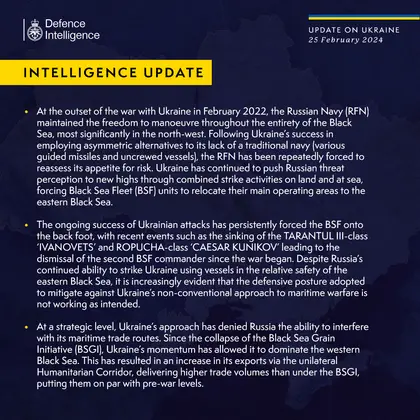- At the outset of the war with Ukraine in February 2022, the Russian Navy (RFN maintained the freedom to manoeuvre throughout the entirety of the Black Sea, most significantly in the northwest. Following Ukraine's success in employing asymmetric alternatives to its lack of a traditional navy (various guided missiles and uncrewed vessels), the RF has been repeatedly forced to reassess its appetite for risk. Ukraine has continued to push Russian threat perception to new highs through combined strike activities on land and at sea, forcing Black Sea Fleet (BS) units to relocate their main operating areas to the eastern Black Sea.
- The ongoing success of Ukrainian attacks has persistently forced the BS onto the back foot, with recent events such as the sinking of the TARANTUL IlI-class'IVANOVETS' and ROPUCHA-class 'CAESAR KUNIKOV' leading to the dismissal of the second BS commander since the war began. Despite Russia's continued ability to strike Ukraine using vessels in the relative safety of the eastern Black Sea, it is increasingly evident that the defensive posture adopted to mitigate against Ukraine's non-conventional approach to maritime warfare is not working as intended
- At a strategic level, Ukraine's approach has denied Russia the ability to interfere with its maritime trade routes. Since the collapse of the Black Sea Grain Initiative (BSGI), Ukraine's momentum has allowed it to dominate the western Black Sea. This has resulted in an increase in its exports via the unilateral Humanitarian Corridor, delivering higher trade volumes than under the BSGI, putting them on par with pre-war levels.
Latest Defence Intelligence update on the situation in Ukraine – 25 February 2024.
— Ministry of Defence 🇬🇧 (@DefenceHQ) February 25, 2024
Find out more about Defence Intelligence's use of language: https://t.co/OJHmhrRCIs#StandWithUkraine 🇺🇦 pic.twitter.com/uX1ryMIAia
To suggest a correction or clarification, write to us here
You can also highlight the text and press Ctrl + Enter
You can also highlight the text and press Ctrl + Enter







